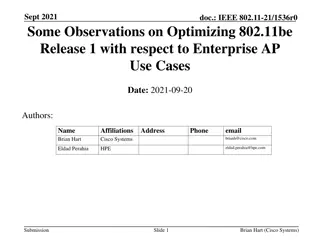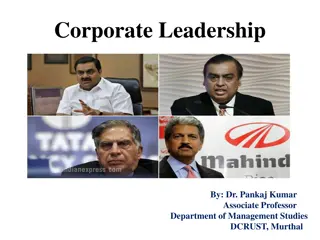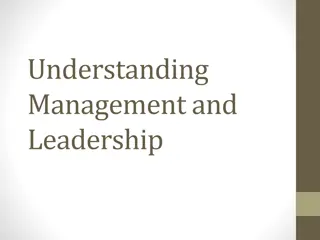Importance of Effective Leadership in Enterprise Management
Effective leadership plays a crucial role in guiding and directing individuals towards achieving organizational goals. It involves influencing behavior, motivating others, and fostering a common purpose within the organization. Characteristics of leadership include having followers, personal qualities, pursuing common goals, maintaining active relations, adopting a practical approach, and viewing leadership as a continuous process of influencing people towards predetermined objectives. Leadership is essential for determining goals, organizing activities, achieving coordination, representing workers, and providing guidance in an enterprise setting.
Download Presentation

Please find below an Image/Link to download the presentation.
The content on the website is provided AS IS for your information and personal use only. It may not be sold, licensed, or shared on other websites without obtaining consent from the author.If you encounter any issues during the download, it is possible that the publisher has removed the file from their server.
You are allowed to download the files provided on this website for personal or commercial use, subject to the condition that they are used lawfully. All files are the property of their respective owners.
The content on the website is provided AS IS for your information and personal use only. It may not be sold, licensed, or shared on other websites without obtaining consent from the author.
E N D
Presentation Transcript
INTRODUCTION Effective leadership is of great importance in an enterprise to enable the enterprise in achieving its objects. Leadership is most important means of direction. Leadership is a process by which an executive directs his subordinates and influences the work and behaviour of others for the common benefit of the organization as well as its members.
DEFINITION OF LEADERSHIP A few definitions by some of the prominent writers on the subject are given below: (1) A Leader is one who guides and directs other people. A leader give the efforts of his followers a direction and purpose by influencing their behaviour . Louis A. Aller (2) Leadership may be defined as the influence, the art or the process of influencing people so that they will strive willingly towards the achievement of group goals . Chester I. Koontz and O Dannel Thus, Leadership is an ability to direct, and motivate other persons in the organization so that they may contribute their efforts towards the success of the organization
CHARACTERISTICS OF LEADERSHIP On the basis of meaning and definition of leadership, following are the characteristics of leadership: 1- Followers The success of leadership depends upon the number of followers, larger be the number of followers, more successful will be the leadership. 2- A personal Quality Leadership is a personal quality of character and behavior, which enables him to influence his men to follow his order and direction. 3- A common Goal Leadership clusters around the achievement of common goals. There must be some common goals before the leader and his followers. All the activities must be oriented to achieve these goals.
4- Active Relations Presence of active relations between a leader and his followers is essential for effective leadership. 5- Practical Approach An effective leader is one who adopts practical approach towards the problems of the enterprise. He should not be rigid. He should change the behavior according to the need of time. He should follow the democratic method of leadership through wide and flexible approach. 6- It is a Process Leadership is a continuous process of directing, guiding, presenting examples and influencing the people to make their best efforts for the attainment of pre-determined objectives.
IMPORTANCE OF LEADERSHIP The significance of leadership in management may be explained as under: 1- Determination Goals A leader performs the creative function of laying down goals and policies for the followers. 2- Organization of Activities A good leader divides organizational activities among the employees in a systematic manner. 3- Achieving Coordination A leader integrates the goals of the individuals with the organizational goals and creates a community of interests. 4- Representation of Workers A leader is a representative of his group. He takes initiative in all matters of interest to the group. 5- Providing Guidance A leader guides the subordinates towards the achievement of the organizational objectives.
6- Inspiring Employees A good leader inspires the subordinates for better performance. 7- Self-Confidence A good leader has confidence in himself whenever he initiates any course. Self-confidence is essential to motivate the followers to boost up their moral. 8- Human Relation Attitudes A successful leader possesses the human relations attitude. He always tries to develop social understanding with other people.
QUALITIES OF A GOOD LEADER Some of the important qualities of an effective leader are under: 1- Intelligence Leaders generally have somewhat higher level of intelligence than the average people. Intelligence is generally expressed in terms of mutual ability to think scientifically, and analyze a accurately the problems before a person. 2- Physical Features Physical characteristics and level of maturity determine personality of an individual which is an important factor in determining success of leadership. Height, weight, physique, health and Appearance of an individual are important for leadership to some extent. 3- Maturity A leader should possess a high level of emotional stability and cool temperament. He needs a high degree of tolerance. He must have an open mind to absorb new ideas as and when necessary.
4- Vision and Foresight A leader should be able to visualize events well in advance. He should have a high degree of imagination, breadth and determination. 5- Inner Motivation Leader have a strong personal motivation to accomplish something. To initiate suitable action in proper time is the main task of a leader. This initiative is due to strong inner motivation. 6- Open Mind A leader should be ready to absorb and adopt new ideas as may be demanded by the situation. He should prepared to accommodate other's view points and alter his decision, if need be. Flexibility is another name for open mindedness which makes the leader more identified with the group. 7- Acceptance of Responsibility A reliable leader is aware of the duties and obligations associated with the position he holds.
8- Self Confidence A good leader has confidence in himself when ever he initiates any course of action. Self confidence is essential to motivate the followers and boost up their moral. 9- Human Relation Attitude A successful leader possesses the human relations attitude. He always tries to develop social understanding with other people. He attempts to achieve the voluntary cooperation of workers.























